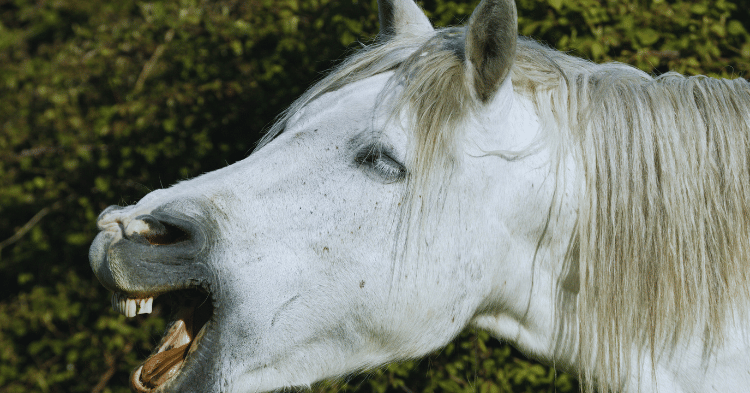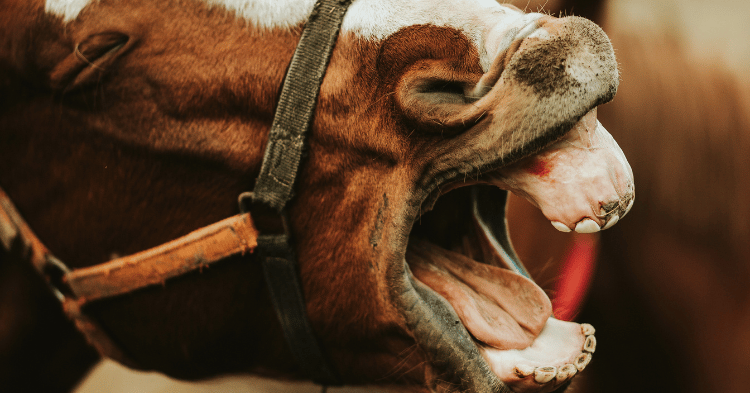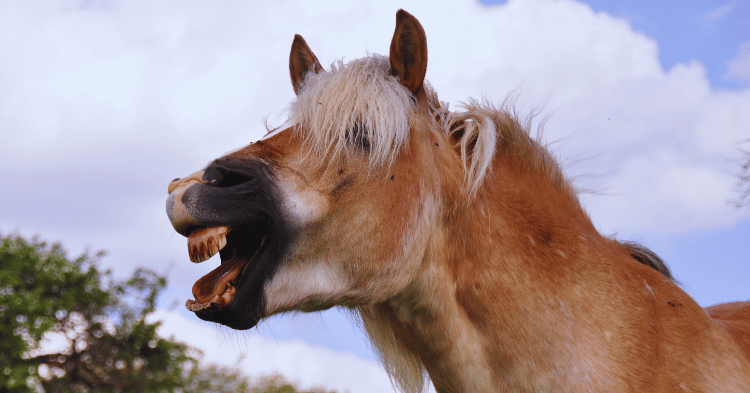A horse’s yawn can seem like an endearing quirk, but beneath that wide-mouthed stretch lies a behavior that has intrigued and puzzled equine enthusiasts for centuries. Do horses yawn? Yes, they do—but not for the same reasons humans do.
While we associate yawning with boredom or sleepiness, a horse’s yawn can be a subtle communication of discomfort, stress, or even contentment. The same motion might signal relaxation after a good stretch or hint at underlying health concerns such as gastric ulcers or dental issues.
Ignoring these yawns could mean overlooking your horse’s attempt to tell you something important. By delving deeper into this fascinating behavior, you’ll uncover insights that can strengthen your bond with your horse and enhance their well-being. Whether it’s a harmless habit or a silent cry for help, understanding why horses yawn is a critical step in their care.
Understanding Horse Yawning
Yawning in horses is a curious behavior that can reveal much about their emotional and physical state. Exploring the reasons behind why horses yawn and how they use this behavior can provide valuable insights for horse owners.
The Science Behind Yawning
Yawning in horses is often linked to the redirection of emotions and the release of stress, especially when anticipating a stressful situation. Unlike other animals, horses tend to yawn when they are trying to calm themselves down or when they start to feel stress. For example, horses are less likely to yawn when they are at peak stress because they usually keep their mouths firmly shut during such times.
Research shows that yawning in horses can be associated with a decrease in arousal states or in response to social changes. This suggests that yawning could serve as a displacement activity to help reduce stress or tension (PubMed Central).
| Factor | Observation |
|---|---|
| Stress Relief | Yawning helps redirect emotions and releases tension |
| Arousal States | Linked to decreased arousal and stress anticipation |
| Social Changes | Seen as a response to changes in social contexts |
| Rare in Herbivores | Yawning behavior is uncommon in herbivores, such as horses |
Yawning as a Communication Tool
In addition to being a stress-relief mechanism, yawning in horses can also act as a form of communication. Similar to stress-related yawning in other animals, such as dogs, horses may use yawning as a calming signal to communicate their emotional state to others in the herd. This behavior allows horses to calm themselves or indicate their anticipation of a stressful situation.
Interestingly, yawning is most prevalent in adult male horses and can be linked to changes in social contexts or even aggressive behaviors in certain situations, like those observed in Przewalski horses. Therefore, understanding the context and frequency of yawning can help horse owners better interpret their horses’ well-being and social interactions.
Yawning can also be observed as a reaction to stress anticipation rather than the stressful event itself, indicating that a yawning horse is not necessarily relaxed but might be trying to achieve relaxation.
To learn more about different aspects of horse behavior, such as can horses cry or do horses know their names, explore our related articles.
By understanding these nuances, horse owners can better interpret their horse’s yawning behavior and take appropriate actions to ensure their well-being.
Factors Influencing Yawning in Horses

Yawning in horses is influenced by several factors, including gender disparities, social stress, and environmental conditions. Understanding these factors can help provide insights into the reasons behind this behavior.
Gender Disparities in Yawning
Gender can significantly impact the frequency of yawning in horses. Research has indicated that adult male horses, particularly stallions, yawn more frequently than females and immature horses (NCBI). This behavior is observed across both wild and domestic species, suggesting a common underlying mechanism.
| Group | Yawning Frequency |
|---|---|
| Adult Males (Stallions) | High |
| Adult Females | Medium |
| Immature Horses | Low |
Testosterone levels might play a role in regulating yawning behavior, as higher levels of this hormone correlate with increased yawning frequency (PubMed Central).
Social Stress and Yawning
Yawning in horses can also be associated with social stress and changes in their social environment. Higher yawning frequency has been linked to situations involving social tension or changes in social context. This behavior can act as a displacement activity that helps reduce tension and manage stress within a group.
For instance, in domestic settings where horses may experience varying social interactions, yawning has been observed more frequently in situations that could cause social stress. This might include changes in herd dynamics or the introduction of new members to the group.
Impact of Environment on Yawning
The environment in which a horse lives also influences its yawning behavior. Studies have shown that horses living in more natural or semi-natural conditions yawn more frequently than those in more restrictive environments. This increased frequency in more natural settings may be due to the greater complexity and variation in environmental stimuli, which can affect the horse’s arousal levels (PubMed Central).
Environmental factors such as temperature, humidity, and overall living conditions can also impact the frequency of yawning. Horses that are comfortable and stress-free in their environment are less likely to exhibit frequent yawning behavior compared to those that experience discomfort or stress.
By understanding these factors, horse owners can gain better insights into their horse’s behavior and well-being. For more on the health implications of yawning, check out our articles on can horses cry and can horse sweat.
Health Implications of Yawning in Horses

Understanding the health implications of yawning in horses can provide valuable insights into their overall well-being. While yawning is often associated with relaxation in humans, in horses, it might signify something entirely different.
Yawning and Stress-Related Conditions
Yawning in horses is a behavior often linked to their attempts to manage stress or arousal. Contrary to popular belief, when a horse yawns, it may not necessarily be in a relaxed state. Instead, yawning can indicate that the horse is trying to calm itself down and release tension.
Stress-related conditions that may trigger yawning include:
- Anticipation of Stressful Situations: Horses might yawn when they are anticipating something stressful, such as being tacked up or ridden. This act serves as a calming signal, helping to manage their nervous system responses.
- Environment-Induced Stress: Changes in the environment, such as new surroundings or different handling routines, might also provoke yawning. Yawning helps to redirect emotions and alleviate stress.
Signs of Stress-Related Yawning:
- Frequent yawning during grooming or tacking up
- Licking and chewing
- Stretching or shaking off
| Stress Trigger | Frequent Actions |
|---|---|
| Anticipation (e.g., being ridden) | Yawning, licking |
| Changes in Environment | Yawning, chewing |
Medical Conditions Linked to Yawning
Medical conditions can also be linked to the frequency of yawning in horses. It is essential to distinguish between yawning due to stress and yawning because of potential health concerns.
Potential Medical Conditions:
- Pain and Discomfort: If a horse is in pain or discomfort, it might yawn more frequently. This can happen due to dental issues, gastrointestinal problems, or even musculoskeletal pain.
- Neurological Issues: Yawning might also be a sign of neurological conditions affecting the horse’s brain or nervous system.
- Respiratory Conditions: Horses experiencing respiratory problems may yawn more as a way to manage discomfort or difficulty in breathing, especially in warmer temperatures, which naturally increase their yawning behavior.
Monitoring Health-Related Yawning:
- Observe for other symptoms like loss of appetite, lethargy, or changes in behavior.
- Keep track of yawning patterns and correlate them with environmental or health changes.
For more on interpreting horse behavior, visit our sections on do horses lay down and can a horse sleep standing up.
Table: Common Conditions and Yawning Indicators
| Medical Condition | Yawning Indicator |
|---|---|
| Dental Issues | Frequent jaw movements, yawning |
| Gastrointestinal Pain | Yawning, discomfort signs |
| Neurological Problems | Repetitive yawning, unusual behavior |
| Respiratory Disorders | Yawning, labored breathing |
Yawning is an essential behavior that can indicate various states of a horse’s well-being. Whether it’s a response to stress or a signal of underlying health issues, paying close attention to when and why horses yawn can provide significant insights into their care needs. For more information on animal behaviors, explore our articles on can horses cry and do horses laugh.
Interpreting Yawning Behavior
Yawning in horses can seem puzzling at first glance, but it offers significant insights into their mental and physical state. By interpreting yawning behavior, horse owners can better understand their equine companions and address their needs more effectively.
Behavioral Indicators in Horses
Yawning in horses is often misinterpreted as a sign of boredom, stretching, or tiredness. However, it actually serves as a calming or appeasement signal, indicating stress and tension release (Good Horse). Horses use yawning, along with licking, chewing, and other responses, to monitor their nervous system and attempt to calm themselves in various situations.
Recognizing these subtle behavioral indicators is essential for assessing a horse’s mental state. For instance, if a horse yawns frequently during grooming or after being brought to a new environment, it might be experiencing stress and trying to relax. Yawning behavior is most prevalent in adult males and is often associated with decreased arousal states or changes in social contexts.
Here are some common behaviors associated with yawning in horses:
- Licking
- Chewing
- Stretching
- Head tossing
- Ear pinning
Observing and noting these behaviors can provide a better understanding of the underlying reasons for yawning. For further insights on equine care and behavior, check our article on do horses cry.
Yawning and Equine Well-Being
Yawning can be a clear indicator of a horse’s attempt to manage and reduce stress. Understanding the context and environment in which the yawning occurs is crucial for interpreting the behavior accurately. For instance, a horse might yawn more frequently in a noisy or unfamiliar environment, suggesting stress or discomfort.
By paying close attention to yawning and other behavioral markers, horse owners can take proactive steps to enhance their horse’s well-being. This might involve:
- Adjusting their environment to minimize stressors
- Implementing a consistent and calming routine
- Addressing any potential physical discomfort through veterinary care
Below is a table summarizing potential causes of yawning and their corresponding indicators:
| Potential Cause | Behavioral Indicators |
|---|---|
| Stress | Frequent yawning, licking, chewing, pinned ears |
| Boredom | Yawning during inactivity, stretching, low energy levels |
| Environmental Change | Increased yawning in new settings, head tossing, restlessness |
| Social Context | More yawning in the presence of new horses, changes in arousal state |
Understanding these signs can help equine owners make informed decisions to improve their horse’s comfort and health. For more information on related behaviors, you might be interested in our articles on can horses sweat and do horses sleep standing up.
Interpreting yawning behavior in horses involves looking beyond the obvious and assessing the broader context. By doing so, horse owners can ensure their equine friends lead healthier and happier lives.

